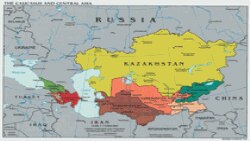<!-- IMAGE -->
Central Asia’s geo-strategic position and rich energy resources are enabling the region’s leaders to vie for influence with the West, Russia, and China.
The former Soviet republics of Kazakhstan, Turkmenistan, Uzbekistan, Kyrgyzstan, and Tajikistan emerged as independent nations after the demise of the former Soviet Union in 1991. Today, the region is a conduit to Afghanistan, and the Central Asian nations are again central – their leaders involved in a complicated balancing act with Russia, China, the United States, and Europe.
U.S. Relations With Central Asia
<!-- IMAGE -->
“The core U.S. interests in Central Asia since independence are to help bolster the sovereignty and independence of these countries by defining diplomatic, strategic, economic, and other forms of relationship with them,” said Evan Feigenbaum, a former high-ranking member of the State
Department.
Specifically, Feigenbaum suggests the United States wants to provide the nations of Central Asia with options to expand their opportunities. “And then, to pursue security cooperation, promote trade and investment, more open societies, good governance and pluralism, and take an interest in the energy development of the region because it is such a key to wealth and prosperity,” said Feigenbaum, now a senior fellow at the Council on Foreign Relations.
Lure of China
<!-- IMAGE -->
Central Asian leaders are also cultivating closer economic ties with China. “The Central Asian countries can trade with China without having to go through third countries to do it, which makes the Chinese market more attractive,” said Eurasian specialist Paul Goble.
“Probably no country on earth was unhappier with the demise of Soviet power in Central Asia than China,” said Goble, “because of the consequences of that demise on Xinjiang, where many of the co-ethnics of the peoples of Central Asia live.”
China continues to worry about instability in its westernmost region, as demonstrated by violence earlier this year between the Uighur minority and the Han Chinese majority populations.
Lingering Influence from Soviet Period
“I think we have to recognize that Central Asia is an area that is rapidly moving toward a perfect storm,” Goble warns. “You have rapidly growing populations. You have economies that are declining. And you have brittle, authoritarian regimes. That is normal recipe for the production of instability, failed states, and terrorism,” he said.
Goble argues that over the next 10 to 20 years, the countries of Central Asia will be far more important sources of anti-Western terrorists than the Arab world today.
Alleged Terrorist Threat and Impact on Human Rights
Authoritarian leaders in the region have used concerns about terrorism as a convenient rationale for curtailing political dissent and human rights. Journalist Alisher Khamidov in Kyrgystan sees a dramatic decline in Western support for human rights and for democratic freedoms over the past 10 years in his country. He sees a connection between this and the rise of authoritarian regimes in the region. Human rights and democracry, said Khamidov, have “taken a back seat in the agenda of the European Union, the United States, and other international actors.”
Supporting Khamidov’s claim, a decision this week by the EU to lift its arms embargo against Uzbekistan stirred an outcry from advocates of human rights and press freedom. Tashkent has improved relations with Western nations by allowing the transit of non-military cargo to Afghanistan.
Role of Political Islam
At the same time, Uzbekistan and the other former Soviet republics of Central Asia have a complicated relationship with their Islamic heritage. “What the Soviets did, by their destruction of the content of religious belief in Central Asia,” said Goble, “was to open the door to a rapid and radical change in the way Islam is viewed there.”
Others are more sanguine about the long-term challenges that political Islam poses to the region. “There has been a rediscovery of traditional culture and traditional religion,” said Feigenbaum. “The governments clearly feel that some of those forms are threatening to the stability of their rule,” he said. “And I think the United States has tried in its conversations with these governments to ensure that governments don’t conflate the challenge of terrorism with the revival of Islam.”
A Delicate Balance
But Washington may be engaged in its own balancing act in Central Asia – preserving military options in an increasingly troubled area of the world, while supporting economic and political developments without antagonizing despotic regimes.




